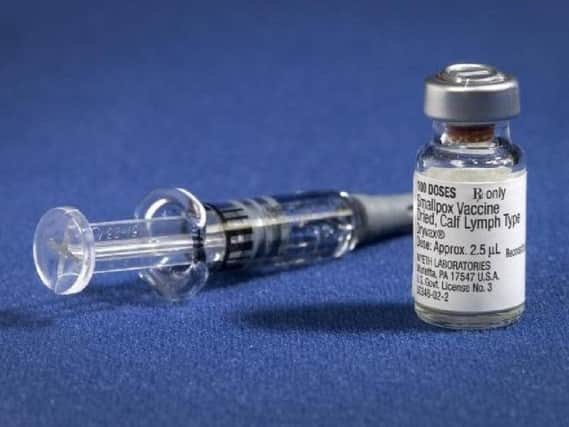Patients offered smallpox vaccine to protect against potential monkeypox infection


The health care worker, reportedly from Fleetwood, is understood to have visited her doctor at Mountview Practice in Dock Street in the port town before being moved to the north east and quarantined.
She was the third person to be diagnosed with the tropical disease in the UK, after treating the second, who had recently visited Nigeria, at Blackpool Victoria Hospital.
Advertisement
Hide AdAdvertisement
Hide AdThe first was a Nigerian resident staying at a naval base in Cornwall in an unconnected case, meaning the medic is thought to be the first to have actually caught monkeypox here.


One woman who attended an appointment at Mountview last Monday said she was contacted by Public Health England, with her and her young child later having a smallpox jab at the Vic, where all staff have also been offered the vaccine in the hope it will lessen the impact of any further diagnoses.
“We are adopting a highly precautionary approach to minimise the risk of additional cases, and are tracing anyone who had contact with this individual during the 24 hours before they noticed a rash,” Public Health England said in a statement last week.
The government body yesterday refused to answer several questions or comment further.
Advertisement
Hide AdAdvertisement
Hide AdMonkeypox is said to be caused by a virus and has initial symptoms of fever, headache, sore muscles, chills, and exhaustion.
A rash then follows, usually developing first on the face before spreading to other parts of the body, while blisters and scabs also develop.
The World Health Organisation (WHO) described monkeypox as a “rare viral zoonotic disease” – a virus given to humans by animals – mostly found in “remote parks of central and west Africa, near tropical rainforests”.
It is similar to smallpox, a deadly disease eradicated in 1980, and, though much milder, it can also be fatal.
Advertisement
Hide AdAdvertisement
Hide AdBetween one and 10 out of every 100 victims die, the WHO said, “with most deaths occurring in younger age groups”. None of the UK cases have been so serious.
The United Nations agency added: “There is no specific treatment or vaccine available, although prior smallpox vaccination was highly effective in preventing monkeypox as well.”
When the first two cases were announced, a hospital spokesman said there was “no further risk to other staff, patients, or visitors,” though they did say the medics who treated the infected patients were being watched for signs of illness.
Dr Nick Phin, deputy director of the National Infection Service said it was “very unusual to see two cases in this short a period of time”, but later said: “We have been actively monitoring contacts for 21 days after exposure to detect anyone presenting with an illness so they can be assessed quickly.
Advertisement
Hide AdAdvertisement
Hide Ad“It is therefore not wholly unexpected a case has been identified.”
All three people were undergoing treatment in isolation in different regions – the Vic patient at the Royal Liverpool University hospital, the medic at the Royal Victoria Infirmary in Newcastle, and the naval base resident at the Royal Free Hospital in London.
Last week, Public Health England said those who had not been contacted “did not need to be concerned”, but conceded a “significant” number of patients at the Vic may have been exposed to monkeypox.
A spokeswoman did not provide even a rough figure, however.
Marie Thompson, the director of nursing at Blackpool Teaching Hospitals NHS Foundation Trust, which runs the Vic, said staff were “working within the guidance of Public Health England”.
Advertisement
Hide AdAdvertisement
Hide AdShe added: “The staff member was picked up early and is getting quick treatment. We know monkeypox is a very rare disease. It is new to this country.
“This is a virus along the lines of having chickenpox. Symptoms are flu-like. You get a rash, but people recover within a few weeks.”
An unnamed friend of the medic, who was quoted in a national newspaper, said: “She’s in a lot of pain and has scabs on her face, up her nose, and over her body. She and her family are worried and distressed.”
Dr Jeremy Farrar, director at biomedical research charity Wellcome, said: “That this third case of monkeypox has been diagnosed now in a healthcare worker in the UK is worrying and an important reminder of the threat posed by infectious diseases in our connected world.
Advertisement
Hide AdAdvertisement
Hide Ad“Whilst cases of monkey pox are thankfully rare, it is an example of one of a number of diseases for which there is no approved vaccine or treatment.
“With proper infection control in place the disease can be controlled and is usually self-limiting and currently poses a very low threat to the wider population.
“International borders present very little barrier for disease, and we must work together and support scientists and researchers wherever they are in the world to develop vaccines and treatments for the patients who need them the most in order to protect us all.”
Prof Jonathan Ball, professor of molecular biology at the University of Nottingham, added: “The fact that only one of the fifty contacts of the initial monkeypox-infected patient has been infected shows how poorly infectious the virus is.
Advertisement
Hide AdAdvertisement
Hide Ad“It is wrong to think that we are on the brink of a nationwide outbreak.
“There are two main strains of virus – West African and Central African.
“Given that the first infected patient had travelled from Nigeria then it would be a reasonable guess that we are dealing with a West African strain; but this needs to be confirmed.
“The West African virus is associated with milder disease, fewer deaths, and limited human-to-human transmission.
Advertisement
Hide AdAdvertisement
Hide Ad“Patients usually clear the infection with relative ease within a few weeks.”
Monkeypox outbreaks since it was first diagnosed in 1970
A nine-year-old boy became the first human to be diagnosed with monkeypox in Zaire – now the Democratic Republic of Congo – in 1970.
Since then, most cases have been in rural, rainforest regions of the Congo Basin and western Africa, the WHO said, particularly in the Democratic Republic of Congo, where it is endemic.
Monkeypox left Africa in early 2003, when cases were confirmed in the United States.
Advertisement
Hide AdAdvertisement
Hide Ad“Most of the patients were reported to have had close contact with pet prairie dogs that were infected by African rodents that had been imported into the country,” the WHO added.
Since 1970, cases have occurred in 10 African countries and, last year, Nigeria experienced its largest documented outbreak.
Transmission, signs, and symptoms
In Africa, human infections usually come from handling infected monkeys, giant rats, and squirrels, with rodents the most likely carrier.
Eating poorly cooked meat of infected animals also carries a risk, the WHO said.
Advertisement
Hide AdAdvertisement
Hide AdHuman-to-human transmission comes from close contact with an infected patient or objects recently contaminated by them.
“There is no evidence, to date, that person-to-person transmission alone can sustain monkeypox infections in the human population,” the WHO added.
A recent study of the prairie dog to human model found two strains of the virus: Congo Basin and West African – with the former more virulent.
The incubation period – the time from infection until symptoms become apparent – ranges from five to 21 days.
Advertisement
Hide AdAdvertisement
Hide AdThe infection is split into two periods: The invasion period, which lasts around five days from infection and results in flu-type symptoms, and the skin eruption period, where various stages of rash break out, with small, fluid-filled blisters following. This lasts up to three weeks.
The number of lesions can vary greatly, from a few to several thousand. Around a third develop on the genitals.
Treatment and prevention
There are no specific treatments or vaccines, though smallpox vaccinations are 85 per cent effective in preventing monkeypox and “will likely result in a milder disease course”, the WHO
said.
During outbreaks amongst humans, close contact with other patients is the “most significant risk factor” and “the only way to reduce infection in people is by raising awareness of the risk factors and education people about the measures they can take to reduce exposure to the virus”.
Advertisement
Hide AdAdvertisement
Hide AdIt added: “Surveillance measures and the rapid identification of new cases is critical for outbreak containment.
“Health care workers caring for patients with suspected or confirmed monkeypox virus infection, or handling specimens from them, should implement standard infection control precautions.”
A hospital spokesman said: “The safety and well-being of all our patients and staff is vitally important to us, and we ensure our staff have the training and equipment they need to do their jobs effectively.
“We have been speaking to staff to provide any further advice or reassurance where necessary.”